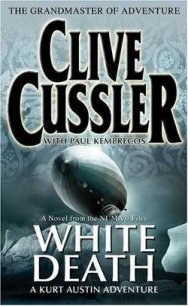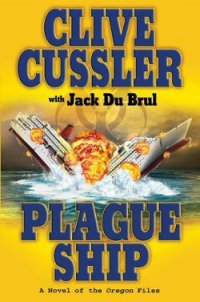Corsair - Cussler Clive (полная версия книги TXT) 📗
“That is enough,” Hakeem snapped, and took away the microphone. “Abdul, take the wheel.” He waved his pistol at Maryweather and the helmsman. “You two, over next to the captain.”
“You can’t leave just one man at the helm,” Kwan protested.
“This is not the first ship we have taken.”
“No. I suppose it isn’t.”
With no discernible government, Somalia was ruled by rival warlords, some of whom had turned to piracy to fund their armies. The waters of this Horn of Africa country were some of the most dangerous in the world. Ships were attacked on an almost daily basis, and while the United States and other nations maintained a naval presence in the region the seas were simply too vast to protect every ship that steamed along the coast. Pirates usually used fast speed-boats and mostly robbed the ships of any cash or valuables, but what started out as simple larceny had expanded. Now entire ships were being hijacked, their cargoes sold on the black market and their crews either abandoned in lifeboats, held for ransom to the vessel’s owners, or killed outright.
So, too, had the sizes of the targeted ships increased along with the savagery of the attacks. Where once only small coastal freighters were the primary targets, the pirates now preyed on tankers and containerships, and had once raked a cruise liner with automatic fire for fifteen minutes. Recently, a new warlord had started putting a stranglehold on other pirates along the north coast, consolidating his power base until every pirate in the region was loyal to him alone.
His name was Mohammad Didi, and he’d been a fighter in the capital, Mogadishu, during the chaotic days of the mid-1990s, when the United Nations was trying to stave off epidemic starvation in the drought-ridden country. He had secured a name for himself plundering trucks loaded with emergency food and supplies, but it was during the Black Hawk Down incident that he cemented his reputation. He had led the charge against an American position and destroyed a Humvee with an RPG. He had then dragged the bodies from the burning wreckage and hacked them to pieces with a machete.
After the inglorious withdrawal of the U.S. Marine Corps, Didi continued to build his power base until he was one of only a handful of warlords controlling the country. Then, in 1998, he had been linked to the Al-Qaeda bombings of the American embassies in Kenya and Tanzania. He had given the bombers safe haven for the weeks leading up to the attack, as well as several men to act as lookouts. With an indictment at the World Court in The Hague and a half-million-dollar price on his head, Didi knew it was only a matter of time before one of his rivals would try to collect on the bounty. He moved his operation out of Mogadishu and into an area of coastal swamps three hundred miles to the north.
Before his arrival, most victims of piracy were set free immediately. It was Didi who had initiated the ransom demands. And if they were not met, or the negotiations seemed to be faltering, he unceremoniously had the crews killed. It was rumored that he wore a necklace of teeth with gold fillings extracted from the men he had personally murdered. It was to Didi that the pirates taking control of the old freighter had pledged their oath.
Hakeem and one of his men forced Captain Kwan to take them to his office, while the other pirates escorted the bridge staff to the mess hall. Kwan’s office was attached to his cabin one deck below the pilothouse. The rooms were spartan but clean, with just a couple of tacky velvet clown paintings on the otherwise bare metal walls. There was a framed photograph of Kwan and a woman, most likely his wife, on the empty desk.
Brassy light blazed through the single porthole.
“Show me crew manifest,” Hakeem demanded.
There was a small safe bolted to the deck in the corner of the office behind Kwan’s desk. The captain stooped over it and began to work the combination.
“You will step back when you open the door,” the pirate ordered.
Kwan glanced over his shoulder. “I assure you we have no weapons.” But he did as he was told. He swung open the door and took a step back from the safe.
With his assistant covering Kwan with his AK, Hakeem bent over the safe, pulling out files and folders and dumping everything on the captain’s desk. He made a sound when he opened one particularly thick envelope and discovered bundles of cash in several currencies. He fanned a wad of hundred-dollar bills under his beaky nose, inhaling as if testing a fine wine.
“How much you have?”
“Twelve thousand dollars, maybe a bit less.”
Hakeem stuffed the envelope into his shirt. He rifled through the papers until he found the crew’s manifest. He couldn’t read his native Somali, let alone English, but he recognized the various passports. There were twenty-two in all. He checked them, pulling out Kwan’s, Duane Maryweather’s, and that of the helmsman. He also found the passports belonging to the three men who had been on deck when they had boarded the ship. He was pleased. They had already accounted for a quarter of the crew.
“Now, take us to the mess hall.”
When they arrived, the brightly lit room was packed with men. A few smoked cigarettes, so the air was as thick as smog, but it masked the stench of nervous sweat. They were a mix of races, and even without the weapons pointing at them they were a dour lot. These were down-on-their-luck men who could find no better employment than aboard a broken-down old tramp freighter. They had maintained her well beyond her years for the simple reason that they would never find another after she was gone.
One of Kwan’s people held a bloody rag to the back of his head. He had obviously said or done something to set off one of the hijackers.
“What’s going on, Captain?” asked the chief engineer. His jump-suit was streaked with grease.
“What does it look like? We’ve been boarded by pirates.”
“Silence,” Hakeem roared.
He went through the stacks of passports he’d brought from Kwan’s office, comparing the photographs to the men seated around the mess until he was certain every member of the crew was accounted for. He had once made the mistake of trusting a captain about his ship’s complement, only to find that there had been two others who had beaten one of Hakeem’s men to death and almost managed to radio a Mayday before they were discovered.
“Very good. No one is playing hero.” He set aside the passports and looked around the room. He was an excellent judge of fear and liked what he saw. He sent one of his men out to the deck to cast off their fishing boat with orders for Abdi to make for their base as quickly as he could with the news they had captured the freighter. “My name is Hakeem, and this ship is now mine. If you follow my orders, you will not be killed. Any attempt to escape and you will be shot and your body fed to the sharks. Those are the two things you must remember at all times.”
“My men will follow orders,” Kwan said resignedly. “We’ll do whatever you say. We all want to see our families again.”
“That is very wise, Captain. With your help, I will contact the ship’s owners to negotiate your release.”
“Bastards won’t spring for a gallon of paint,” the engineer muttered to a table companion. “Fat luck they’ll pay to save our hides.”
Two of the gunmen had been in the kitchen gathering up anything that could be used as a weapon. They emerged dragging a linen bag full of forks, steak knives, kitchen knives, and cleavers. One gunman remained in the mess while the other continued to haul the bag out into the hallway, where it would most likely be thrown over the side.
“These guys know what they’re doing,” Duane whispered to the ship’s radio operator. “I would have gone for a knife as soon as their guard was down.”
Maryweather hadn’t realized one of the pirates was directly behind him. The Kalashnikov crashed down on the back of his neck hard enough to drive his face into the Formica-topped table. When he straightened, blood dripped from a nostril.




